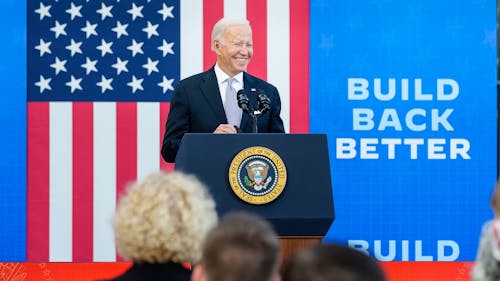Rutgers experts speak on political implications of Build Back Better Act, likelihood of Senate passage

On Nov. 19, President Joseph R. Biden Jr. announced the passage of the Build Back Better Act in the U.S. House of Representatives. Rutgers professors discussed the likelihood of the bill getting approved by the Senate and its political significance.
Ross Baker, a distinguished professor in the Department of Political Science, said that the act is of great importance and will provide two years of universal preschool, tax credits for families with children and an expansion of Medicaid and Medicare coverage, among various other reforms.
He said the bill needs 51 votes to pass in the Senate, and if it ends up similar to the legislature that was passed by the House, it would be one of the biggest pieces of social legislation passed in the 21st century.
“If it emerges from the Senate fairly closely resembling what the House passed, it will be a landmark piece of legislation,” Baker said. “It will be much more a significant accomplishment than the Affordable Care Act ... and probably the most important piece of legislation since the Great Society legislation in the 1960s that was signed by President Lyndon Johnson.”
On the other hand, David Greenberg, an associate professor in the Department of History and the Department of Journalism and Media Studies, said the significance of the Build Back Better Act has been overstated by Democrats and other supporters, such as through comparisons to former President Franklin D. Roosevelt’s New Deal.
“This is nothing on the scale of the New Deal,” Greenberg said. “It’s still an important bill, but they would have done better to just talk about a few individual pieces, whether it be the childcare or health care support, and just talk in very concrete terms how those programs are going to help peoples' lives.”
As a consequence, he said the bill has received more opposition than it might have otherwise received. Republicans remain firmly opposed to its passage in its current state, according to an article from ABC News.
“The president's going to have a lot of conversations with senators in the course of this bill going through the Senate,” Baker said. “This is going to pass with Democratic folks only … they probably don't even want it to be bipartisan because they want to be able to get credit only for Democrats.”
If passed, Baker said the bill will be a major accomplishment that Democrats can present to the public in the 2022 elections in order to sway voters in their favor. Though, he said it is highly likely that there will be changes made to the bill in the Senate.
Greenberg also said he believes it is likely changes will be made to the bill as it is typical for this to happen to any piece of legislation, though exact changes cannot be predicted at this time.
The bill will receive any changes through two different processes, the first being a “Byrd bath” where the Senate parliamentarian identifies provisions for removal that violate the Byrd rule, such as by having no direct effect on revenue, spending or Social Security. Baker said the immigrations provisions in the bill will likely get removed during this process.
The second process, a “vote-a-rama,” will allow senators to propose and vote on an unlimited amount of amendments to the bill.
Once the process is complete, Greenberg said the Build Back Better Act may not actually be too significant for the Biden Administration, given its similarity to previous bills they have already passed.
“I think it’s going to be somewhat negligible,” he said. “Biden passed, back in the spring ... the American Rescue Plan, and then, we just had a big infrastructure bill. And so, this is the third one, and I think voters don't really notice that much of a difference between one, two or three. Either he’s going to get credit for having done a lot of big things, and with it, having a strong economy, or ... inflation is going to come back to hurt him.”



